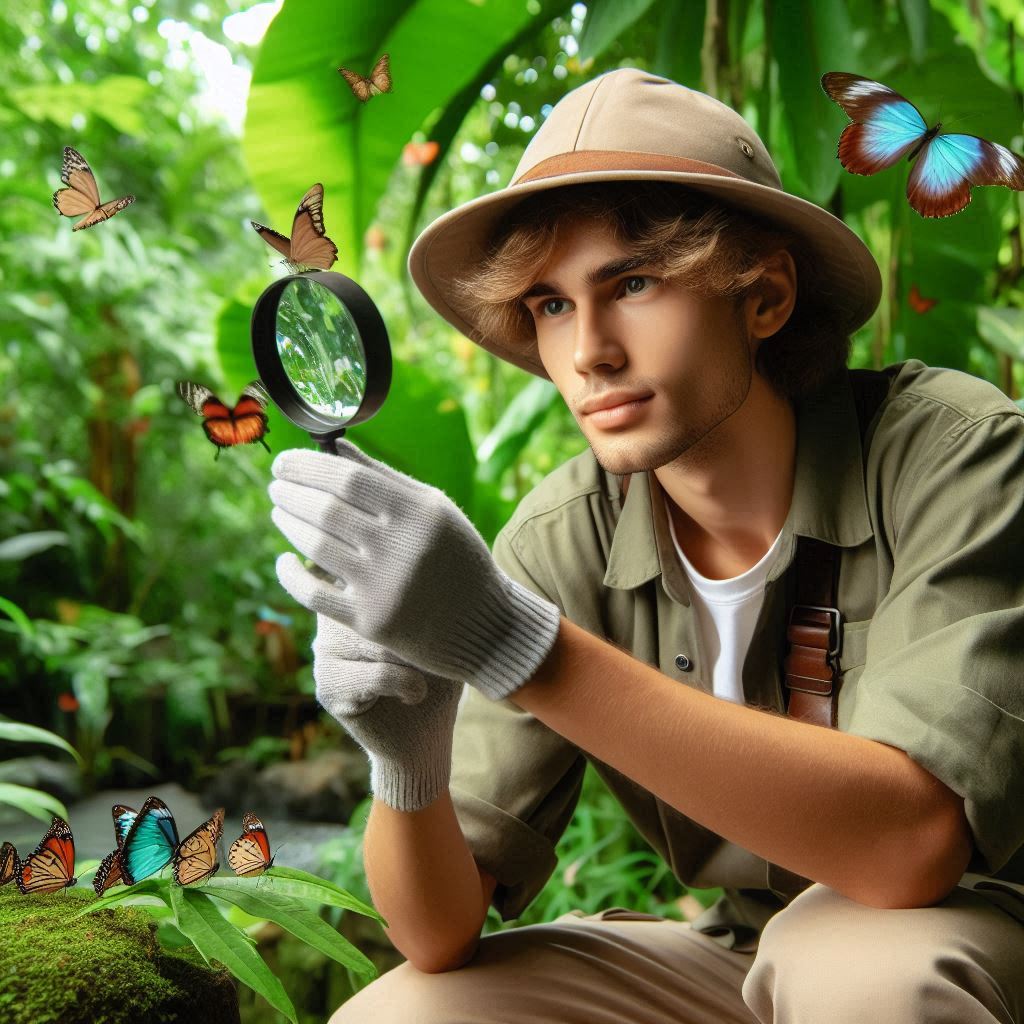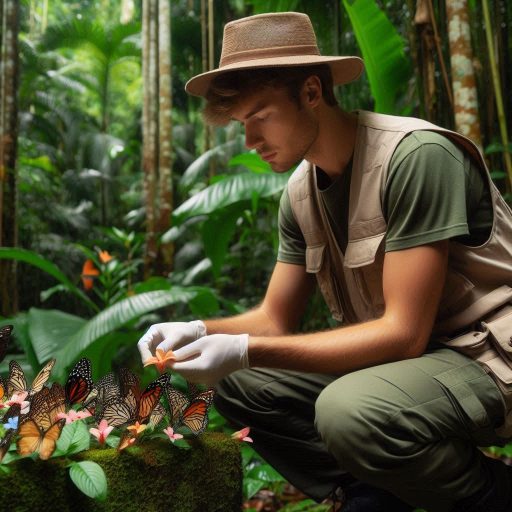Introduction
Zoologists play a vital role in studying animals and their behavior, physiology, and habitats.
They delve into the complexities of various species, conducting research to understand how animals interact within ecosystems.
Their work often involves field studies, laboratory experiments, and extensive data analysis.
Zoologists contribute significantly to wildlife conservation and help develop strategies for preserving endangered species, thus ensuring the sustainability of our planet’s biodiversity.
Education plays a crucial role in pursuing a career as a zoologist.
Most positions require at least a bachelor‘s degree in zoology, biology, or a related field.
A solid educational background provides aspiring zoologists with foundational knowledge in animal biology, ecology, and conservation.
Advanced roles often necessitate a master‘s or doctoral degree, allowing specialists to focus on areas such as marine biology, wildlife management, or animal behavior.
This higher-level education fosters a deeper understanding of complex biological systems and enhances research capabilities.
Practical experience is equally essential in this field.
Students can gain hands-on experience through internships, volunteering, and research projects, which help develop important skills and knowledge.
Such experiences often allow aspiring zoologists to work alongside experienced professionals, providing valuable insights into real-world applications of their studies.
Internships also help build a professional network, which is crucial for job opportunities after graduation.
High School Education Requirements
Recommended courses to take in high school
High school students aspiring to become zoologists should focus on specific courses.
Taking biology classes is essential.
They provide foundational knowledge about animal life and ecosystems.
Advanced Placement (AP) Biology offers a deeper understanding and may earn college credit.
Chemistry courses are equally important.
They help students grasp the chemical processes that sustain life.
Physics also plays a role in understanding animal movements and behaviors.
Taking courses in mathematics, particularly statistics, enhances data analysis skills.
Students should also consider enrolling in environmental science classes.
These classes explore ecosystems, conservation, and the impact of humans on wildlife.
Understanding these concepts is crucial for future zoologists.
Participation in extracurricular activities related to science is beneficial.
Join science clubs or engage in science fairs.
These activities allow students to explore their interests and develop critical thinking skills.
Finally, students should seek opportunities for fieldwork or nature studies.
These experiences can provide practical insights into animal behavior and habitats.
Many schools offer field trips to local zoos, aquariums, or nature reserves.
Internship opportunities for high school students interested in zoology
Internships offer valuable experience for high school students interested in zoology.
Many zoos and aquariums have internship programs for high school students.
These internships often provide hands-on experience with animals and their care.
Volunteering at local animal shelters or wildlife rehabilitation centers is another great option.
Students gain practical skills while assisting with animal care and rehabilitation.
These experiences can strengthen a college application and provide networking opportunities.
Some organizations offer summer programs focused on wildlife conservation.
Programs through non-profits allow students to participate in field research and conservation projects.
These experiences expose students to the practical aspects of zoology.
Students can also look for internships at environmental organizations.
These internships often involve research, conservation efforts, or education outreach.
Gaining exposure to various aspects of zoology can help students refine their interests.
Online platforms also offer virtual internships related to zoology.
These programs can enhance knowledge while providing flexibility.
They may include research projects or educational content creation related to animal sciences.
Networking is crucial for finding internship opportunities.
Reach out to teachers, local zoologists, or wildlife biologists for advice.
They may know about available internships or volunteer positions.
Additionally, students should attend local science fairs or workshops.
These events often feature organizations that can provide internships or volunteer opportunities.
Networking at these events can lead to valuable connections in the field.
Undergraduate degree options for aspiring zoologists
Bachelor‘s Degree Programs in Zoology or Related Fields
Most aspiring zoologists start with a bachelor’s degree in zoology, biology, or wildlife science.
These programs typically cover essential topics like animal physiology, genetics, and ecology.
Coursework includes both lectures and laboratory work, allowing students to apply their knowledge in practical settings.
Students should look for programs that offer diverse courses.
Subjects such as animal behavior, conservation biology, and evolutionary biology are crucial.
A well-rounded education helps students develop a comprehensive understanding of animal life.
Additionally, many universities provide opportunities for field studies.
Field studies enable students to observe animals in their natural habitats.
This hands-on experience is invaluable for applying classroom knowledge to real-world situations.
Importance of Gaining Hands-On Experience
Hands-on experience is crucial for aspiring zoologists.
Engaging in research or internships during undergraduate studies enhances learning and builds essential skills.
Many employers prefer candidates with practical experience, making it a key factor in the job market.
Internships provide valuable exposure to the field.
Students can work in zoos, wildlife rehabilitation centers, or conservation organizations.
These experiences help students develop practical skills and establish professional connections.
Networking during internships can lead to job opportunities after graduation.
Research experience is equally important.
Participating in faculty-led research projects allows students to gain insight into scientific methods.
This experience teaches students how to collect and analyze data.
Additionally, it prepares them for potential graduate studies or careers in research.
Students should actively seek research opportunities.
They can approach professors about assisting with ongoing projects.
Many universities offer summer research programs, which can be highly beneficial.
Volunteering in relevant organizations also provides experience.
Working with local wildlife conservation groups or animal shelters exposes students to different aspects of zoology.
These experiences broaden their understanding and enhance their resumes.
Therefore, aspiring zoologists should pursue a bachelor‘s degree in zoology or a related field.
This education provides the foundation necessary for a successful career in the field.
Gaining hands-on experience through research or internships is equally important.
Practical experiences enhance learning and improve job prospects.
By combining education and experience, new graduates position themselves for a rewarding career in zoology.
The journey may be challenging, but the opportunity to work with animals and contribute to conservation is immensely rewarding.
Read: Top Skills Needed for a Successful Geology Career
Graduate degree options for further specialization
Master‘s Degree Programs in Zoology, Wildlife Biology, or Ecology
Master‘s degree programs offer various specializations for aspiring zoologists.
These programs typically last two years and involve coursework, research, and a thesis.
Students gain hands-on experience through fieldwork and laboratory research.
They learn vital skills in data analysis, species identification, and conservation techniques.
Many universities offer focused programs in wildlife biology or ecology.
Wildlife biology programs concentrate on the study and management of wildlife populations.
They often include courses on animal behavior, habitat restoration, and wildlife conservation policies.
These skills are crucial for those seeking careers in conservation organizations or government agencies.
Ecology programs emphasize the interactions between organisms and their environments.
Students learn about ecosystem dynamics, biodiversity, and environmental impact assessments.
This knowledge is beneficial for careers in environmental consulting or habitat management.
Internships and research opportunities are essential components of master‘s programs.
Students often work with faculty on ongoing research projects.
These experiences help build a professional network and enhance employability.
Graduates frequently secure positions in wildlife management, conservation advocacy, or research.
Doctoral Programs for Those Interested in Conducting Research or Teaching in Academia
For those who aspire to teach at the university level or conduct independent research, a doctoral program is necessary.
Doctoral programs in zoology or related fields typically require four to six years to complete.
Students focus on original research, culminating in a dissertation that contributes to the field.
In doctoral programs, students choose specific areas of study, such as marine biology, conservation genetics, or animal physiology.
They engage in extensive research, often collaborating with established scientists.
This collaboration enhances their expertise and prepares them for academic careers.
Graduates of doctoral programs often pursue careers in academia, conducting research and teaching at universities.
They may also work in governmental or non-governmental organizations, focusing on conservation policy and research initiatives.
Their advanced training positions them as experts in their chosen fields.
In review, becoming a zoologist involves a clear educational path.
A master’s degree provides specialization and practical experience, while a doctoral degree opens doors to research and academia.
By pursuing advanced degrees in zoology, wildlife biology, or ecology, aspiring zoologists prepare for diverse career opportunities.
Whether in research, conservation, or education, they play a crucial role in understanding and protecting the animal kingdom.
Read: The Future of Botany: Emerging Fields and Innovations
Skills and Qualities Needed to Succeed as a Zoologist
Strong Analytical and Problem-Solving Skills
Zoologists often face complex questions regarding animal behavior, ecology, and conservation.
They need strong analytical skills to assess data accurately.
These skills enable them to interpret findings and draw meaningful conclusions.
Analytical skills help zoologists design experiments and research projects.
They must understand scientific methods and data collection techniques.
By applying these methods, zoologists can gather relevant information about various species.
Problem-solving skills are equally important.
Zoologists frequently encounter unexpected challenges during research.
For example, they may face difficulties in tracking animal populations or assessing habitat conditions.
Effective problem-solving allows them to adapt and find solutions.
Zoologists also analyze environmental issues affecting wildlife.
They identify factors contributing to habitat loss or species decline.
By applying their analytical skills, they can recommend conservation strategies to protect endangered species.
Moreover, strong analytical abilities enhance a zoologist’s credibility.
Colleagues and stakeholders rely on their data-driven insights.
This reliance underscores the importance of rigorous analysis in scientific research.
Ability to Work Well in a Team and Communicate Effectively
Collaboration is a fundamental aspect of zoology.
Zoologists often work in multidisciplinary teams with other scientists, conservationists, and policy-makers.
The ability to work well in a team enhances research outcomes and fosters innovation.
Effective communication is vital in team settings.
Zoologists must share their findings clearly and concisely.
They often present their research to diverse audiences, including the public and scientific community.
Strong communication skills help bridge the gap between scientific concepts and public understanding.
Zoologists also write reports and research papers.
Clear and precise writing ensures that their work is accessible to others.
This accessibility is essential for influencing conservation policies and practices.
Networking is another important aspect of collaboration.
Building relationships with fellow scientists can lead to new research opportunities.
Strong interpersonal skills help zoologists establish connections within the scientific community.
Moreover, effective teamwork enhances problem-solving efforts.
Collaborating with others often brings different perspectives and expertise.
This diversity can lead to innovative solutions to complex challenges.
Read: What Does a Geologist Do? Career Overview and Insights

Career opportunities for zoologists
Job Prospects in Government Agencies, Research Institutions, and Conservation Organizations
Zoologists find job opportunities in government agencies.
These positions often focus on wildlife management and policy development.
Federal organizations like the U.S. Fish and Wildlife Service hire zoologists to assess animal populations and their habitats.
State and local agencies also employ zoologists for similar roles.
They conduct field studies and develop conservation plans.
These positions allow zoologists to impact local ecosystems and protect wildlife.
Research institutions provide another career avenue for zoologists.
They can work in universities or private research organizations.
Here, zoologists conduct studies that contribute to scientific knowledge and understanding of animal behavior and biology.
Many zoologists collaborate with interdisciplinary teams to tackle complex research questions.
They often publish their findings in scientific journals, contributing to global knowledge.
This collaboration enhances their professional network and opens doors to new opportunities.
Conservation organizations offer another rewarding path.
These nonprofit groups focus on protecting endangered species and restoring habitats.
Zoologists in these roles conduct research, educate the public, and advocate for wildlife conservation.
These organizations often require zoologists to engage with communities and stakeholders.
Effective communication skills are essential for raising awareness about conservation efforts.
Zoologists can impact local communities and foster a culture of environmental stewardship.
Potential for Advancement and Growth Within the Field
Zoologists enjoy various opportunities for advancement and growth in their careers.
With experience, they can move into management roles or lead research projects.
Senior positions often involve overseeing teams, managing budgets, and developing strategic plans.
Professional development plays a crucial role in career advancement.
Zoologists can pursue additional certifications or advanced degrees to enhance their qualifications.
Specializing in specific areas, such as marine biology or wildlife conservation, increases job prospects and earning potential.
Networking within professional organizations is also beneficial.
Groups like the American Society of Mammalogists and the Society for Conservation Biology offer resources and connections.
These organizations host conferences and workshops, providing valuable opportunities for career growth.
Moreover, the demand for zoologists may increase as global awareness of environmental issues grows.
More organizations prioritize wildlife conservation and research, creating additional job opportunities.
Zoologists can play a vital role in addressing challenges related to biodiversity and habitat loss.
Ultimately, a career as a zoologist offers diverse job prospects and potential for advancement.
Opportunities exist in government agencies, research institutions, and conservation organizations.
With dedication and continuous professional development, aspiring zoologists can build fulfilling careers while contributing to the understanding and preservation of animal life.
Read: Educational Path: Becoming a Geologist in the USA
Transform Your Career Today
Unlock a personalized career strategy that drives real results. Get tailored advice and a roadmap designed just for you.
Start NowDiscover More: Ethical Considerations in Immunology Research
Salary Expectations for Zoologists
Average Starting Salary for Entry-Level Positions
The average starting salary for entry-level zoologists typically ranges from $35,000 to $50,000 per year.
This salary can vary based on various factors, including education, location, and the specific employer.
For instance, those with a bachelor‘s degree in zoology or a related field usually earn at the lower end of this range.
Zoologists with a master’s degree or specialized training may command higher starting salaries.
Some positions in research or conservation organizations might offer better compensation due to the advanced skills required.
Additionally, internships and fieldwork experiences can enhance a candidate‘s qualifications and lead to higher starting pay.
Factors That Can Influence Salary, Such as Location and Level of Experience
Several factors influence a zoologist’s salary, with location being one of the most significant.
Zoologists working in urban areas or regions with a high cost of living often earn more.
For example, positions in major cities like San Francisco or New York typically offer higher salaries compared to rural areas.
The type of employer also impacts salary levels.
Zoologists employed by government agencies may earn different salaries than those working for private research firms or non-profit organizations.
Some positions in academic settings may offer lower salaries but provide other benefits, such as research funding and educational opportunities.
Experience plays a crucial role in determining salary.
Entry-level zoologists may start at a lower salary but can expect increases with experience and advancement.
As they gain experience, zoologists can progress to higher positions, such as senior researchers or project managers, which come with increased pay.
Continuing education and specialized training can also influence earning potential.
Zoologists who pursue additional certifications or advanced degrees often enhance their skills and marketability.
This professional development can lead to promotions and salary increases over time.
Networking within the field can also open doors to higher-paying positions.
Attending industry conferences, joining professional organizations, and connecting with mentors can provide valuable opportunities for career growth.
Explore Further: Impact of Zoologists on Wildlife Conservation Efforts
Conclusion
In this blog, we explored the education and career path for becoming a zoologist, emphasizing the essential steps needed to succeed in this field.
We discussed the necessary academic qualifications, including earning a bachelor’s degree in zoology or a related biological science.
This foundational degree provides essential knowledge about animal biology, ecology, and conservation.
For those seeking advanced positions, pursuing a master‘s or Ph.D. can greatly enhance job prospects and research opportunities.
We also highlighted the importance of gaining practical experience through internships, volunteer work, and field studies with animals.
These experiences not only build valuable skills but also help you establish connections in the field.
Networking within professional organizations can open doors to job opportunities in research, conservation, education, and wildlife management.
For readers interested in pursuing a career as a zoologist, I encourage you to follow your passion for animals and nature.
Immerse yourself in relevant coursework and seek hands-on experiences to build your skills and knowledge.
Participating in research projects or joining wildlife conservation groups can significantly enhance your resume.




